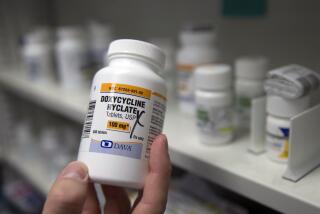U.S. Panel Calls for Faster OK of AIDS Drugs
- Share via
WASHINGTON — President Reagan’s AIDS commission issued an urgent call Wednesday for faster approval of drugs for AIDS treatment and said that it will consider proposing such controversial steps as supplying clean needles and syringes to drug addicts, the group among whom the virus is raging out of control.
AIDS victims are “crying for more work with experimental drugs” and are “willing to use their own bodies in that test,” retired Adm. James D. Watkins, the commission chairman, told a White House news conference after delivering an interim report to the President. He said that there are 44 experimental drugs available worldwide to deal with AIDS, but only one, AZT, is licensed for sale in the United States.
Watkins said that he is trying to get ampligen, a drug available in France, for a commission staff member who is hospitalized with AIDS.
Meanwhile, the federal Centers for Disease Control issued a separate report repeating its estimates that 1 million to 1.5 million persons carry the AIDS virus. However, Dr. Otis R. Bowen, secretary of health and human services, called for calm. AIDS “is not a wildly spreading epidemic among heterosexuals, as some people fear,” he told the news conference. “Panic should be avoided.”
The report estimated prevalence of the AIDS virus among heterosexual adults at two one-hundredths of 1%, a figure equal to 2 in 10,000 persons.
AIDS continues to spread “because of high risk behaviors among groups,” Bowen said. “The homosexual community has listened to the educational campaign perhaps better than the IV drug users,” he added. Drug addicts, who spread the disease through the use of shared needles and syringes and through sexual contacts, are “the hardest to reach,” he said. “If they need a fix, they could care less about AIDS.”
The menace of AIDS among intravenous drug users, those who inject the drugs, was a particular focus of the presidential commission’s interim report.
There are long waiting lists for drug treatment programs, and some facilities bar AIDS victims, Watkins said. “Yet, we know that without such programs there will be little chance to halt the growing spread of the virus among this segment of the population,” he said in the letter transmitting the interim report to the President.
An alternative approach, to be debated at the commission’s hearings this month, would call for supplying clean needles and syringes to addicts who inject drugs. Under some state laws, this could be considered illegal.
“I am not going to allow us to shy away from these difficult issues,” Watkins said.
Intravenous drug abuse, he said, is one of the four AIDS topics that “cry for early resolution” in the commission’s work. The others, he said, are the need for better information on the prevalence of the infection, the need for home health programs and other out-of-hospital care for AIDS patients and the need for more AIDS treatment drugs.
“The deadly nature of AIDS demands new and streamlined approaches to drug and vaccine development,” Watkins said. This view could put the presidential commission in conflict with Bowen, who believes that the drug approval process already has been considerably accelerated. AZT was approved on a fast-track basis by the Food and Drug Administration.
Medical authorities are torn between the desire to find new drugs and the fears of doing harm. One experimental drug, since dropped, had disastrous side effects that worsened the condition of AIDS patients.
But AIDS patients know that they have a fatal disease and are desperate to get access to new treatments, Watkins said.
The commission “will not start poking fingers at anyone,” Watkins said, but he insisted that more drugs be made available more quickly. “We can no longer wait on that issue; we are putting it up front” in the commission’s work, he said.
Another interim report, covering those four key topics, will be delivered in February, with the final report due in June, Watkins said.
The CDC report, a summary of current knowledge about AIDS, called for studies in 30 metropolitan areas, including Los Angeles and San Francisco, to get better information on the disease. Anonymous blood testing will be done at clinics and hospitals.
There will be other pilot studies to determine if a confidential national survey is feasible, selecting households at random.
Of the 1 million to 1.5 million persons estimated to be carrying the AIDS virus, about 47,000 have developed the disease itself and 60% of them have died, Dr. James Mason of the Centers for Disease Control said.
Among heterosexually active persons, the prevalence of the virus “remains very low on a national basis compared with persons with specific risk behavior or known sexual exposure to persons at increased risk,” the CDC report said.
The figure of two one-hundredths of 1% for heterosexual adults between 15 and 59 was based on testing of blood donors and military recruits, the report said.
More to Read
Sign up for Essential California
The most important California stories and recommendations in your inbox every morning.
You may occasionally receive promotional content from the Los Angeles Times.













